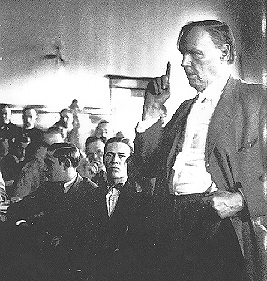Clarence Darrow, the son of an Ohio furniture maker, was at the time of the Leopold and Loeb trial America's best known defense lawyer. Darrow was "a sophisticated attorney with the mannerisms of a country lawyer." His jury arguments show Darrow to be well-read in the fields of literature, poetry, psychology, and philosophy. His speeches and writings show him to have been an iconoclast and gadfly of the first order. His clients, after giving up at age 37 a corporate practice for the Chicago and North Western Railway, included murderers, communists, socialists, and anarchists.
Prior to the Leopold-Loeb trial, Darrow was modestly famous; after the Leopold-Loeb trial, he was famous. Infamous, some would say. Darrow reported receiving hundreds of letters that were "abusive and brutal to the highest degree." The public seemed to believe, wrote Darrow, that he "should join the state and the mob and help get his clients hanged."
One cannot read Darrow's summation without concluding that it was as much an attempt to change public attitudes concerning the criminal justice system and the death penalty as it was an effort to persuade Judge Caverly not to hang his clients. Because the trial was very closely followed in the national press, it is likely that his attacks on the death penalty did cause some minds to change. Some newspapers took the unusual step of reprinting his rambling, yet sometimes moving, twelve-hour summation in full. Darrow threw himself into the defense effort. "No client of mine had ever been put to death," he remarked, "and I felt it would almost kill me if it should ever happen." Throughout the weeks of trial preparation and trial, there was for Darrow "little rest by day and but little rest by night." In his autobiography, Darrow describes the period as the most hectic in his life. Darrow reports that when he finally finished his long summation, "I had exhausted all the strength that I could summon."
Darrow received about $40,000 for his work on the Leopold-Loeb trial, far less than was generally assumed, given the financial resources of the defendants' families.
Leopold and Loeb were to Darrow not just clients, but people he cared about. He visited them several times in prison, including a final meeting with Leopold just weeks before Darrow's death in 1938. Leopold later remembered Darrow as "the kindest man I have ever known." Kindness was, said Leopold, his "fundamental characteristic" and "all-embracing."

